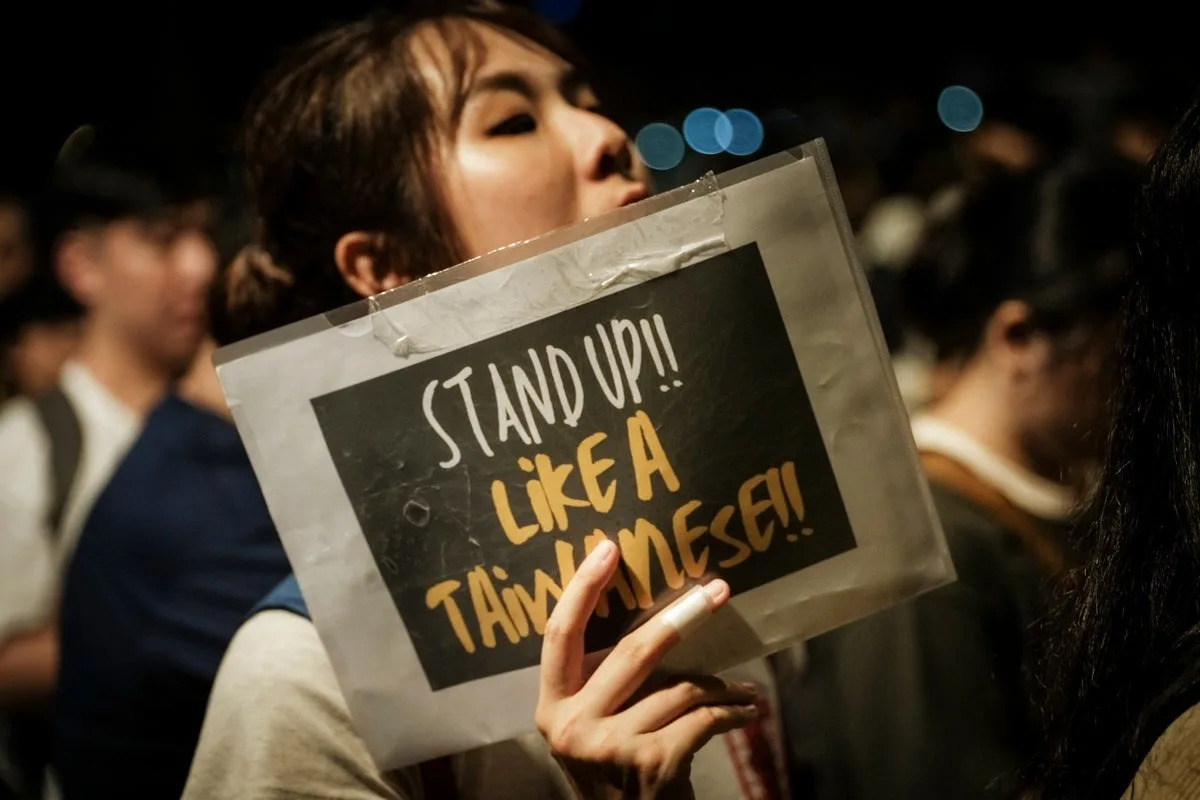Taiwan’s youth protest plans by lawmakers favoring closer China ties to tighten scrutiny of president

Thousands of mostly young protesters surrounded Taiwan’s legislature late into the night on Tuesday, protesting a push by opposition parties to subject the island’s new leader and his administration to tighter scrutiny from a parliament controlled by lawmakers who favor closer ties to China.
The protest marks a chaotic start to the presidency of Lai Ching-te, who was sworn in Monday after winning a historic third consecutive term for the ruling Democratic Progressive Party (DPP), which champions Taiwan’s sovereignty and is loathed by Beijing.
It also illustrates the challenges Lai’s fledgling administration faces without a parliamentary majority, which is now controlled by two opposition parties, the Kuomintang (KMT) and Taiwan People’s Party (TPP).
Demonstrators are angered by what they see as the KMT and TPP’s attempt to fast track a bill through the legislature, which would grant the parliament sweeping powers to impose greater oversight over the executive branch of government.
Some protesters carried sunflowers, in a nod to the student-led protest movement in 2014 that saw hundreds of students occupying the legislature for weeks in protest against the KMT’s controversial trade deal with China. Those protests were instrumental two years later in the electoral defeat of the KMT, which has since been unable to recapture the presidency.
Under the proposed legislation, government officials could be fined or jailed under what critics say is a vaguely worded new criminal offense of “contempt of parliament,” if they were found making false statements to the legislature.
They could also be punished if they refused to answer questions or provide documents, or withheld information during hearings.
Meanwhile, the president would be required to deliver an annual address to the parliament on key policy issues.
Opponents say the proposals could force officials to disclose sensitive information to parliament – such as those relating to diplomacy and defense – or face criminal penalties. They believe this could potentially undermine the island’s security.
The DPP has also accused the opposition of trying to force through the bill without allocating sufficient time for policy deliberations.
Meanwhile, the KMT and TPP argue the new laws are needed to improve government accountability and combat corruption, pointing to similar legislative checks and balances on executive powers around the world. They also accused the DPP of spreading disinformation and trying to paralyze the legislature.
In a sign of the heated political divide, disagreements over the controversial reform bill erupted last Friday in a brawl on the parliamentary floor – a chaotic display that saw some lawmakers leaping over tables and pulling colleagues to the floor, with a few members taken to hospital.
Get AfriPrime Android Web View app....Click the link to Amazon app store to download https://rb.gy/3xek46
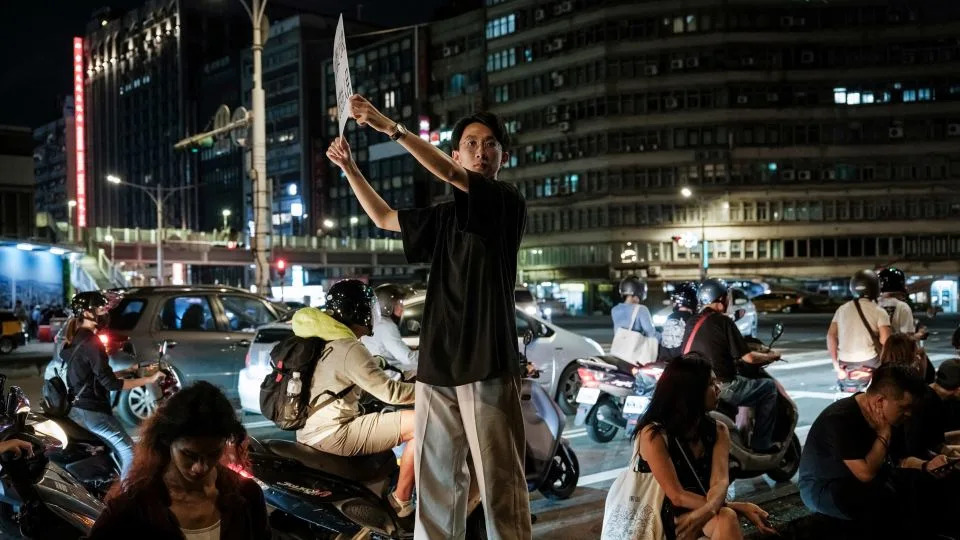
On Tuesday, as the parliament resumed its meeting to discuss the bill, protesters gathered outside the Legislative Yuan – Taiwan’s unicameral parliament – from morning until midnight, braving downpours in the afternoon. Many joined after finishing school and work, with organizers claiming more than 30,000 participants.
Some held up signs calling the legislative process a “black box” and demanding the bill to be withdrawn. Others chanted: “No discussions, no democracy!”
Ricky Li, a 28-year-old office worker, said he was worried about the bill’s vague wording and lack of consultation.
“I’m concerned that it will open the door to power abuses by the legislators … What if legislators start using the newly acquired power to wage vendettas against their political opponents?” he said, noting that the bill has not been sufficiently discussed and lacks transparency.
“Given the current circumstances of cross-strait relations and that a new government just took office, the opposition’s assault on Taiwan’s democratic institutions and political foundation warrants our attention.”
Discussions on the bill are expected to resume in the legislature on Friday.
Lai, 64, a former doctor and vice president, was inaugurated Monday alongside new Vice President Hsiao Bi-khim, who recently served as Taiwan’s top envoy to the United States.
Both leaders and their party are openly loathed by Beijing for championing Taiwan’s sovereignty. China’s ruling Communist Party says the self-ruling democracy is part of its territory, despite never having controlled it, and has vowed to take the island, by force if necessary.
Get AfriPrime Android Web View app....Click the link to Amazon app store to download https://rb.gy/3xek46
Protests erupt over opposition bill to rein in executive as new Taiwan leader starts work
Taiwan’s new president Lai Ching-te marked his first day at work watching thousands of people surround the island’s parliament to protest a legislative attempt by opposition parties to subject the new administration to tighter scrutiny.
A reform bill brought by the Kuomintang and Taiwan People’s Party aims to punish government functionaries for a vaguely described offence of “contempt of parliament” if they make false statements to the legislature or refuse to answer questions or provide documents or withhold information.
The proposed legislation also requires the president to make an annual address to the parliament on key policy matters.
Mr Lai’s party and its supporters claim that the legislation could undermine Taiwan’s security by compelling disclosure of sensitive diplomatic or strategic information to lawmakers.
The Kuomintang and the Taiwan People’s Party, which are expected to make a final push to pass their bill on Friday, argue that new laws are needed to improve government accountability and combat corruption, CNN reported.
The opposition parties are considered to be more favourable towards Beijing. Mr Lai, his party and their supporters are viewed as “separatist”.
In his first speech after being sworn in on Monday, Mr Lai pointedly stressed Taiwan’s sovereignty, angering Beijing which has a longstanding policy of reunifying the island with the Chinese mainland.
The new leader said he hoped “China will face the reality” of Taiwan’s existence, “respect the choices” of its people “and in good faith choose dialogue over confrontation”. He added that the island was determined to defend itself “in the face of the many threats and attempts at infiltration from China”.
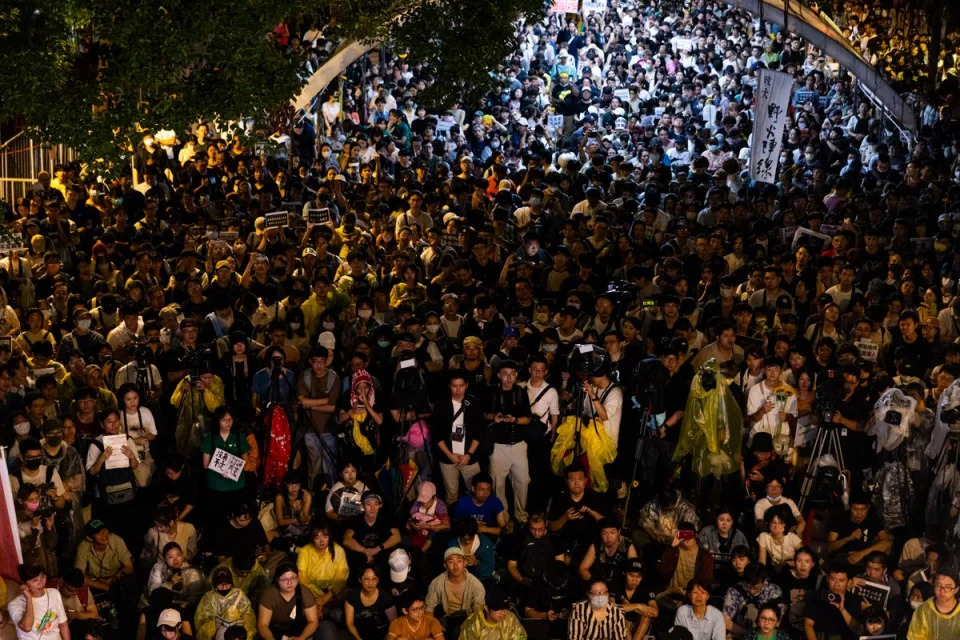
On Tuesday, as lawmakers debated the reform bill late in the evening, the protesters outside accused opposition parties of trying to force the reforms through and of working in concert with China to “kill democracy”.
“I think with so many people coming out today it is a warning to lawmakers that they need to be aware their power is bestowed by the people,” said Lee Li, 24, a university student.
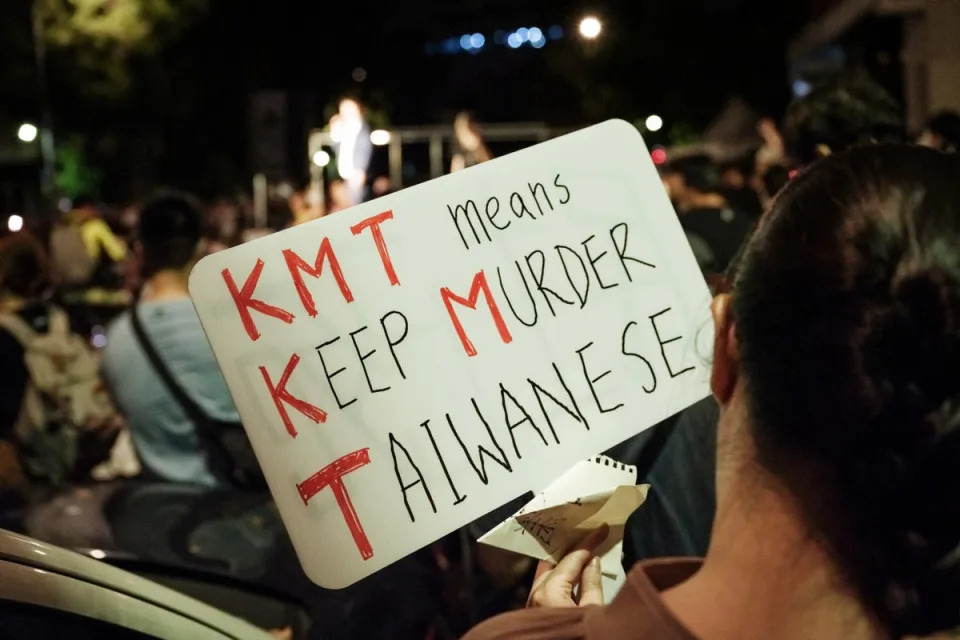
Inside the parliament, known as Legislative Yuan, chaos reigned as lawmakers unfurled banners and shouted at each other. But there was no physical altercation like on Friday.
While ruling party’s lawmakers wore headbands reading “Democracy has died”, opposition members displayed reading “Reforming parliament, let sunshine in”.
The ruling party’s whip, Ker Chien-ming, taunted the opposition lawmakers saying: “On the speaker’s platform today is not the KMT or the TPP. It’s Xi Jinping.”
He was met with shouts of “Shut up!”
Get AfriPrime Android Web View app....Click the link to Amazon app store to download https://rb.gy/3xek46
China has launched new drills encircling Taiwan. Why now?
Tensions are once again ratcheting up in the Taiwan Strait, with China launching military drills encircling Taiwan just days after the democracy swore in a new leader long loathed by Beijing.
The exercises began early Thursday, in what China described as “punishment” for “separatist acts” – alluding to the election and inauguration of the self-governing island’s new President Lai Ching-te.
Though relations between the two sides have been steadily worsening in recent years, this latest escalation marks a significant test for Taiwan’s new leader, whose ruling party has championed democracy in the face of growing threats from its authoritarian superpower neighbor.
China’s ruling Communist Party says Taiwan is part of its territory, despite never having controlled it, and has vowed to take the island, by force if necessary. And it has become much more bellicose under Chinese leader Xi Jinping.
Here’s what you need to know.
Get AfriPrime Android Web View app....Click the link to Amazon app store to download https://rb.gy/3xek46
What’s happening with the drills?
The Eastern Theater Command of the Chinese People’s Liberation Army (PLA) said it launched joint military drills involving the army, navy, air force and rocket force in areas around Taiwan early Thursday morning.
The drills are being conducted in the Taiwan Strait – a narrow body of water separating the self-ruling island with mainland China – as well as north, south and east of Taiwan.
They are also taking place in areas around Taiwan’s outlying islands of Kinmen, Matsu, Wuqiu and Dongyin, located just off China’s southeastern coast, the command said in a statement.
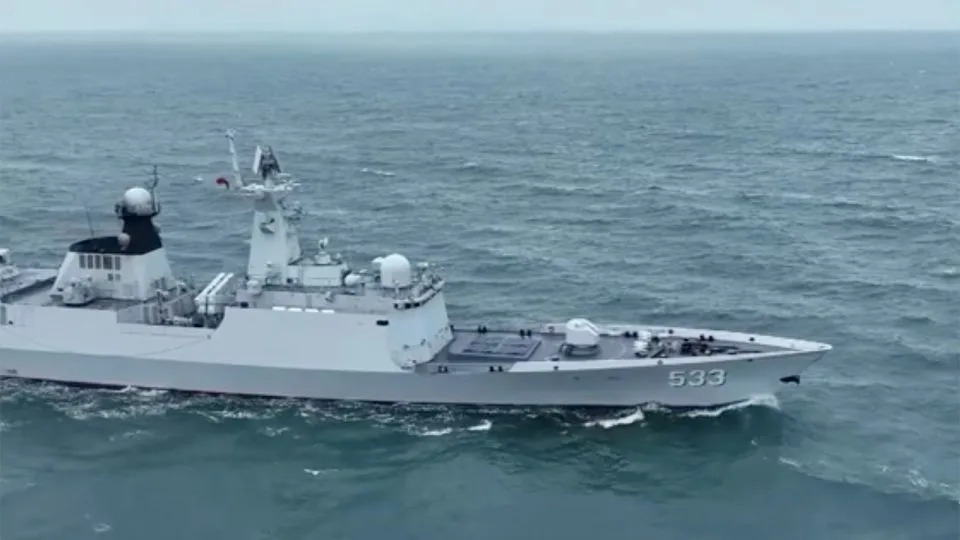
Naval Colonel Li Xi, spokesperson for the command, called the exercises “a strong punishment for the separatist acts of Taiwan independence forces and a serious warning against interference and provocation by external forces.”
China’s military drills are often as much about playing to a domestic audience as signaling intentions internationally. Chinese state media heavily covered Thursday’s drills while the military also posted footage of one of its vessels on social media. The exercises subsequently went viral on China’s heavily regulated internet.
Taiwan’s Defense Ministry said in a statement it had dispatched sea, air and ground forces to respond to China’s drills. It expressed regret to “such irrational provocations and actions that undermine regional peace and stability.”
The island’s presidential office said in a statement that it was “confident and capable of defending national security,” accusing China of “using unilateral military provocation to threaten Taiwan’s democracy and freedom.”
Get AfriPrime Android Web View app....Click the link to Amazon app store to download https://rb.gy/3xek46
What triggered this?
The most obvious answer is Lai’s inauguration on Monday.
Lai’s Democratic Progressive Party (DPP), now in power for a historic third term, views Taiwan as a de facto sovereign nation with a distinct Taiwanese identity.
Ahead of Taiwan’s elections back in January, Beijing had warned that a Lai victory could inflame tensions and spark conflict – repeatedly framing the vote as a choice between “peace and war.”
Taiwanese voters dismissed those warnings, returning the DPP to power – although two opposition parties that favor closer ties with China now have a majority in parliament.
China’s government and state media regularly rebuke Lai, calling him a dangerous separatist, “troublemaker” and “war maker,” while rejecting his repeated offer of talks.
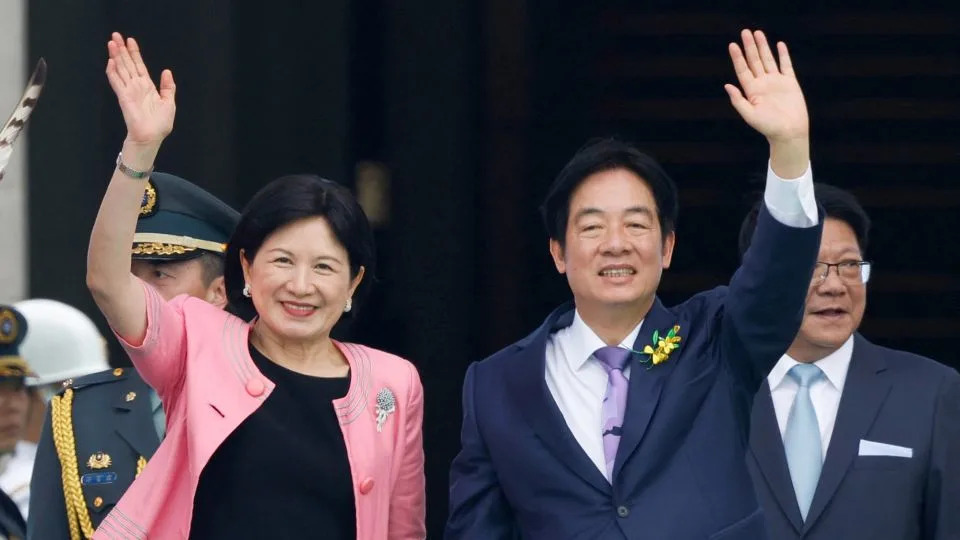
Their vehement dislike of Lai is rooted in his political past, as well as Beijing’s refusal to deal directly with a huge swathe of Taiwan’s leaders.
The 64-year-old former doctor and political veteran was once an open supporter of Taiwan independence – a red line for Beijing.
His views have tempered over the years, and he now says he favors the current status quo, saying there is “no plan or need” to declare independence since the island is “already an independent sovereign country.”
But Beijing has never forgiven him for those early comments – making its stance clear with the drills on Thursday.
Lai, too, has set the tone for his new administration’s approach to China – using his inaugural speech on Monday to declare that a “glorious era of Taiwan’s democracy has arrived,” and reiterating a determination to defend its sovereignty.
He also called on Beijing to cease its “intimidation” of Taiwan and respect that its people want to decide their own destiny.
Get AfriPrime Android Web View app....Click the link to Amazon app store to download https://rb.gy/3xek46
What’s the relationship between China and Taiwan?
The bloody Chinese Civil War ended with the Chinese Communist Party (CCP) taking power in the mainland, establishing the People’s Republic of China (PRC) in Beijing in 1949.
The defeated Nationalist Party fled to Taiwan, moving the seat of their Republic of China (ROC) government from the mainland to Taipei.
Both proclaimed themselves the sole rightful government of the entire Chinese territory.
In recent years, Taiwan has downplayed its territorial claims over mainland China, and is today a vibrant democracy, with its own military, currency, constitution and elected government.
But it is not recognized as an independent country by most governments in the world. Over the decades it has become increasingly isolated diplomatically – with an increasing number of governments switching their diplomatic recognition from Taipei to Beijing. But unofficial diplomatic ties with many Western nations have in fact been bolstered in recent years, in part thanks to China’s sabre-rattling.
Meanwhile, under Xi, China has become increasingly assertive in foreign policy and grown more authoritarian at home.
China has cut official communication with Taiwan since the the DPP took office in 2016, and has ramped up economic, military and diplomatic pressure on the island.
At the same time, ties between Taipei and Washington have become more robust, with increased arms sales and high-level political engagement under Lai’s popular predecessor Tsai Ing-wen. This has infuriated Beijing, spurring it to unleash more pressure on Taiwan and sending cross-strait relations on a downward spiral.
Get AfriPrime Android Web View app....Click the link to Amazon app store to download https://rb.gy/3xek46
Where does the US stand in this?
The US formally switched diplomatic recognition from Taipei to Beijing in 1979 – but has long trod a delicate middle path.
In what is known as the “One China” policy, Washington recognizes the People’s Republic of China as the sole legitimate government of China; it also acknowledges Beijing’s position that Taiwan is part of China, but has never accepted the Chinese Communist Party’s claim of sovereignty over the island.
The US maintains close unofficial ties with Taiwan, which have been strengthened in recent years. It is bound by law to provide the democratic island with the means to defend itself, and supplies the island with defensive weaponry.
American lawmakers regularly visit Taiwan and have supported legislation to bolster US support for the island and its defensive capabilities.
But it has historically remained deliberately vague on whether it would defend Taiwan in case of a Chinese invasion, a policy known as “strategic ambiguity.”
After the island’s election in January, the US sent an bipartisan delegation to Taiwan, where they met with Lai and Tsai – and promised that American support for Taiwan will continue no matter who wins the upcoming US election.
Beijing on Tuesday also announced sanctions against former US House Representative Mike Gallagher, who led that delegation, citing his “remarks and actions” that “interfere” in China’s internal affairs.
Get AfriPrime Android Web View app....Click the link to Amazon app store to download https://rb.gy/3xek46
Taiwan’s president visits military base as China surrounds country with mock invasion drills
Watch live as Taiwan’s President Lai Ching-te reacts to China’s military drills announcement during a visit to a military base on Thursday (23 May).
A furious China has launched a major military exercise surrounding Taiwan, saying they are “punishment” for the comments of newly elected Taiwanese president Lai Ching-Te.
China, which claims democratically governed Taiwan as its own territory, derides Mr Lai as “separatist”, and earlier this week denounced Mr Lai’s inauguration speech in which he called on China to stop its threats and said the two sides of the strait were “not subordinate to each other”.
Taiwan has scrambled its own jets and put missile, naval and land units on alert after the Chinese People’s Liberation Army started joint military drills, involving the army, navy, air force and rocket force, in areas around the independent island at 7.45am.
Denouncing China’s drills, Taiwan’s defence ministry called it an “irrational provocation that has jeopardised regional peace and stability”. It said that though Taiwan does not seek conflict, it “will not shy away from one”.
Get AfriPrime Android Web View app....Click the link to Amazon app store to download https://rb.gy/3xek46
Taiwan's new president tells China to stop threats, 'face reality' of Taipei's existence
New Taiwanese President Lai Ching-te has urged China to cease military and political threats, advocating for peace and stability through dialogue rather than confrontation.
Key points:
-
Lai, who was sworn into office on Monday, emphasized Taiwan’s sovereignty in his inauguration speech and reiterated the island’s commitment to defend its democracy and freedom.
-
China criticized Lai’s speech as promoting separatism, insisting that Taiwan belongs to it and that Taiwan independence is “a dead end.”
-
Aside from strengthening Taiwan’s defenses, Lai pledged to address economic challenges, enhance the social safety net and help advance key fields, including artificial intelligence.
The details:
-
Lai, 64, who previously served as vice president, succeeded former President Tsai Ing-wen after winning a three-way race in January. He and new Vice President Hsiao Bi-khim took their oath of office on Monday, becoming Taiwan’s fifth pair of elected leaders.
-
In his inauguration speech, Lai called on China to “cease their political and military intimidation against Taiwan” and expressed hope that Beijing will “face the reality of the Republic of China's [Taiwan’s] existence.” Still, he maintained that his government “will uphold the Four Commitments, neither yield nor provoke and maintain the status quo.”
-
China, which sees Taiwan as a renegade province, has long expressed its intent to reunite with the island, using force if necessary. On the eve of Lai's inauguration, seven Chinese aircraft and seven naval vessels were reportedly detected around Taiwan.
-
While he called for dialogue over confrontation, Lai reiterated Taiwan’s resolve to defend itself “in the face of the many threats and attempts of infiltration from China.”
-
In response, China slammed Lai’s speech as promoting “the fallacy of separatism.” Chen Binhua, a spokesperson from the Taiwan Affairs Office of China’s State Council, said Beijing will “never tolerate or condone any form of ‘Taiwan independence’ separatist activities” and that “both sides of the Taiwan Strait belong to one China” regardless of who governs Taiwan.
-
Aside from strengthening Taiwan’s defense capabilities, Lai sets his eyes on tackling economic issues, enhancing the social safety net, continuing reform efforts, improving public safety and advancing key industries, including AI. “We must do all we can to expedite Taiwan's transformation into an ‘AI island,’” he said.
Get AfriPrime Android Web View app....Click the link to Amazon app store to download https://rb.gy/3xek46
China warns Taiwan of reprisals over Lai inauguration speech
China on Tuesday slammed the inauguration speech of new Taiwanese President Lai Ching-te as a "confession of Taiwan independence", and warned it would take "countermeasures".
Earlier, Beijing said it had complained to the United States over Secretary of State Antony Blinken congratulating Taiwan on Lai's swearing-in.
China considers self-ruled Taiwan part of its territory and has not ruled out the use of force to bring the island under its control.
It has branded Lai, who was sworn in on Monday, as a "dangerous separatist".
In his speech Monday, Lai said a "glorious era of Taiwan's democracy has arrived" and thanked citizens for "refusing to be swayed by external forces, for resolutely defending democracy".
"Yesterday's speech... can be described as a downright 'confession of Taiwan independence'", a statement from Beijing's Taiwan Affairs Office (TAO) released late Tuesday read.
It added that "(China) must take countermeasures and penalize the DPP authorities for colluding with external forces in their provocations for 'independence'".
The statement -- attributed to TAO spokesperson Chen Binhua -- did not specify what retaliatory measures from Beijing would entail.
Chinese warplanes and naval vessels maintain a near-daily presence around the island, but in recent days, there has not been a significant uptick in the numbers.
"I would like to emphasise that no matter what (Lai) says or how he says it, it will not change the status and fact that Taiwan is a part of China... The complete reunification of the motherland must be realised and can certainly be realised," Chen's statement added.
Also on Tuesday, China's foreign minister Wang Yi said that Taiwan "separatists will be nailed to the pillar of shame in history", according to a statement published by the ministry.
Get AfriPrime Android Web View app....Click the link to Amazon app store to download https://rb.gy/3xek46
- 'Insurmountable red line' -
Taiwan has been self-governed since 1949, when nationalists fled to the island following their defeat by communist forces in the Chinese civil war on the mainland.
Washington switched diplomatic recognition from Taipei to Beijing in 1979, but it has remained Taiwan's most important partner and biggest arms supplier.
Blinken said in his congratulations message that he looked forward to Washington and Taipei maintaining "peace and stability across the Taiwan Strait".
Beijing said Tuesday his message "seriously violates the One China principle... and sends a wrong signal to separatist forces".
"We are strongly dissatisfied and firmly opposed to this, and have lodged stern representations with the United States," foreign ministry spokesman Wang Wenbin said at a regular news conference.
"The Taiwan issue is the core of China's core interests and the first insurmountable red line in relations between China and the United States," he added.
"We urge the United States to immediately correct its mistakes."
Blinken's statement came as China said Monday it would sanction three US defence companies over their sales of arms to Taiwan.
US President Joe Biden sent a delegation -- including former National Economic Council director Brian Deese and ex-deputy secretary of state Richard Armitage -- to Taipei for the inauguration.
More than 40 other countries, including Japan and Canada, also sent delegations.
Eight heads of state from countries that recognise Taiwan were also present.
China on Tuesday strongly condemned their attendance, calling it "crude interference in China's internal affairs" and saying it "endanger(ed) peace and stability across the Taiwan Strait".
Get AfriPrime Android Web View app....Click the link to Amazon app store to download https://rb.gy/3xek46
- Questions and Answers
- Opinion
- Story/Motivational/Inspiring
- Technology
- Art
- Causes
- Crafts
- Dance
- Drinks
- Film/Movie
- Fitness
- Food
- Games
- Gardening
- Health
- Home
- Literature
- Music
- Networking
- Other
- Party
- Religion
- Shopping
- Sports
- Theater
- Wellness
- News
- Culture
- War machines and policy


